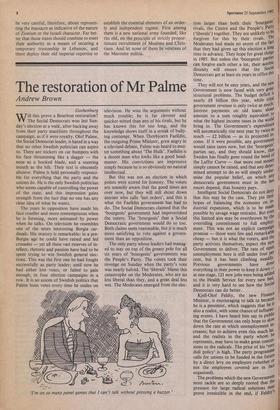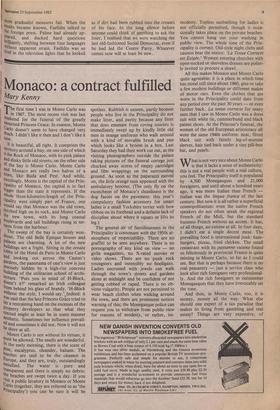The restoration of Mr Palme
Andrew Brown
Gothenburg Will this prove a Bourbon restoration? The Social Democrats won last Sun- day's election at a walk, after backing away from their party manifesto throughout the campaign, as if it were royalty. Olof Palme, the Social Democrat leader, is hated in a way that no other Swedish politician can aspire to. There are stickers on car bumpers with his face threatening like a dagger ŌĆö the nose as a hooked blade, and a sneering mouth as the hilt. Their text is obscenely abusive. Palme is held personally responsi- ble for everything that the party and the unions do. He is the only Swedish politician who seems capable of controlling the power of the state, and this impression gains strength from the fact that no one has any clear idea of what he wants.
The years in opposition have made his face crueller and more contemptuous when he is listening, more animated by power when he talks. On television he resembles one of the more interesting Borgia car- dinals. His oratory is remarkable: in a pre- Borgia age he could have raised and led crusades ŌĆö yet all these vast reserves of in- tellect, rhetoric and passion have had to be spent trying to win Swedish general elec- tions. This was the first one he had fought successfully as party leader; until now he had either lost votes, or failed to gain enough, in four election campaigns in a row. It is an axiom of Swedish politics that Palme loses votes every time he smiles on television. He wins the arguments without much trouble; he is far cleverer and quicker-witted than any of his rivals, but he has known this for too long, and the knowledge shows itself in a streak of bully- ing contempt. When Thorbjoern Faelldin, the outgoing Prime Minister, grew angry in a televised debate, Palme was heard to mut- ter something about 'The Hulk'. Faelldin is a decent man who looks like a good head- master. His convictions are impressive simply because he is so obviously no natural intellectual.
But this was not an election in which points were scored for honesty. The voters are uneasily aware that the good times are over now, but they will still shout down anyone who calls 'last orders', and this is what the Faelldin government has had to do. The Social Democrats claimed that the 'bourgeois' government had impoverished the voters: The `bourgeois' that a Social Democratic government would do so too. Both claims seem reasonable, but it is much more satisfying to vote against a govern- ment than an opposition.
The only party whose leaders had manag- ed to stay on top of the greasy pole for all six years of 'bourgeois' governments was the People's Party. The voters took their revenge on Sunday when the party's vote was nearly halved. The 'liberals' blame this catastrophe on the Moderates, who are no less liberal than they, and a great deal less wet. The Moderates emerged from the elec- 'I'm ŌĆö on so many panel games that I can't talk without pressing a buzzer.' tion larger than both their 'bourgeois rivals, the Centre and the People's Party (`liberals') together. They are unlikely to be
forgiven for this by their rivals. The
Moderates had made no secret of the fact that they had given up this election a long time in advance. They hope for great things in 1985. But unless the 'bourgeois' parties can forgive each other a lot, their acerbic disunity will ensure that the Social Democrats get at least six years in office this time.
They will not be easy years, and the new Government is now faced with very great
structural problems. The budget deficit is
nearly ┬Ż8 billion this year, while total government revenue is only twice as much.
Interest payments on old loans alone amount to a sum roughly equivalent to what the highest income taxes in the world
bring in. The Government's expenditure will automatically rise next year by twice as much ŌĆö ┬Ż2 billion ŌĆö as its projected in come. If it were possible, any government would raise taxes now, but the 'bourgeois' parties say, and they should know, that
Sweden has finally gone round the bend of
the Laffer Curve ŌĆö that more real moneY simply cannot be raised, and that any deter- mined attempt to do so will simply under- mine the popular belief, on which any democratic government must in the last resort depend, that honesty pays. Intelligent Social Democrats do not deny that this may be the case. They pin their
hopes of balancing the economy on in"
dustrial expansion, which is to be made possible by savage wage restraint. But even this limited aim may be overthrown by the overriding commitment to full eMPI┬░Y- ment. This was not an explicit campaign promise ŌĆö those were few and remarkable cheap ŌĆö but it is what the voters, and the party activists themselves, expect the new Government to deliver. The rate of open unemployment here is still under four Per cent, but it has been climbing steadilYŌĆó Previous governments have done everything in their power to keep it down at one stage, 121 new jobs were being added to the Health Service for every new bed.; and it is very hard to see how the Social Democrats can do better.
Kjell-Olof Feldty, the new Finance Minister, is encouraging to talk to because he is a pessimist, which suggests that he is
also a realist, with some chance of influenc- ing events. I have heard him say in public that the Government can only hope to slay, down the rate at which unemployment in" creases; but to achieve even this much he,
and the realists in the party whom he
represents, may have to make great conces- sions to the radicals. The price of his 'veil dull policy' is high. The party programine calls for unions to be funded in the future by a direct levy on employers (whether or not the employees covered are in fact organised). The problems which the new Government must tackle are so deeply rooted that the pressure for large radical solutions InaY prove irresistible in the end, if FeldtY'.s more gradualist measures fail. When the I results became known, Faelldin talked to the foreign press. Palme had already ap- peared, and ducked hard questions brilliantly, shifting between four languages Without apparent strain. Faelldin was so tired in the television lights that he looked
as if dirt had been rubbed into the creases of his face. In the long silence before anyone could think of anything to ask the loser, I realised that we were watching the last old-fashioned Social Democrat, even if he had led the Centre Party. Whatever comes now will at least be new.



































 Previous page
Previous page